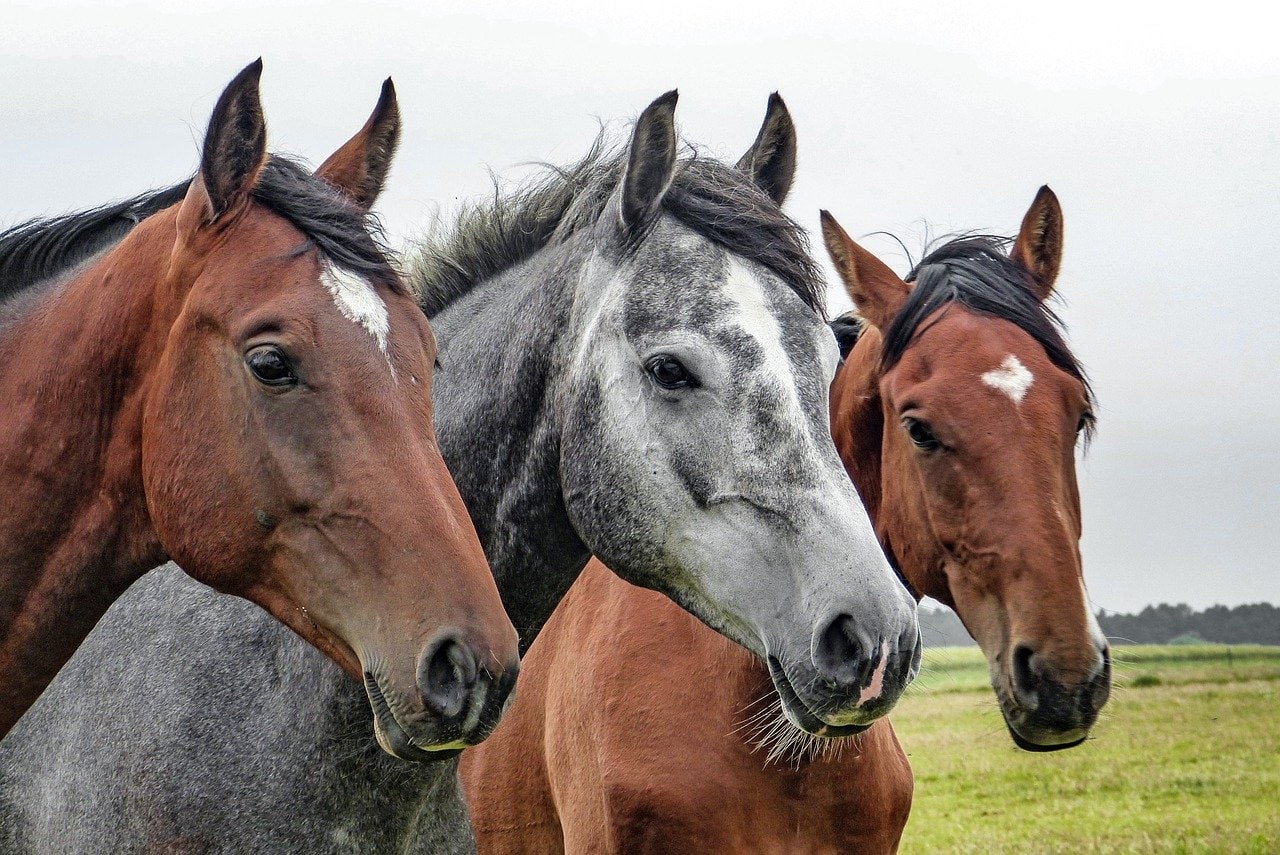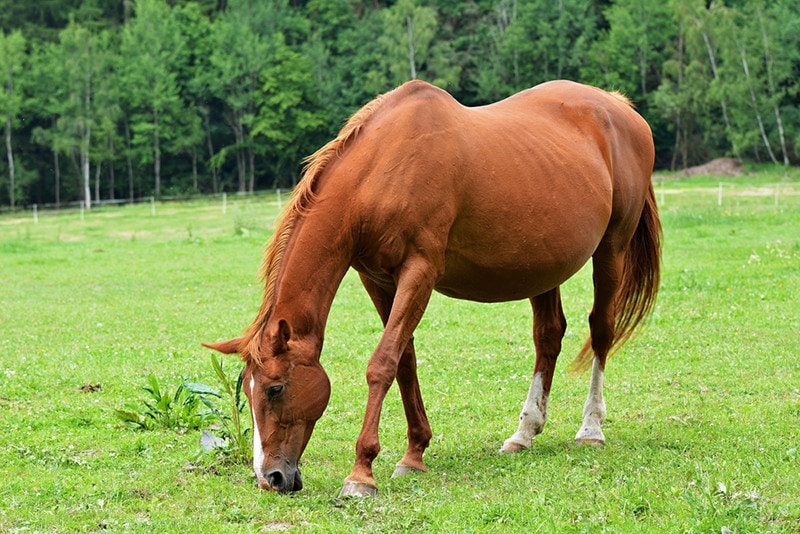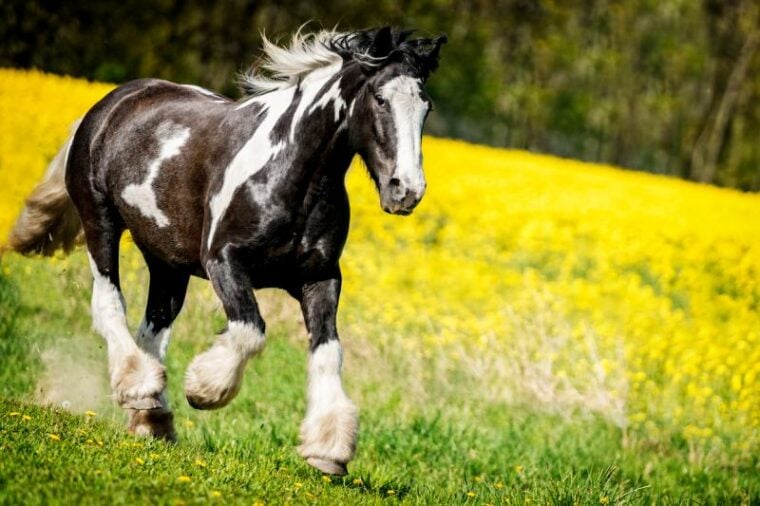
Click to Skip Ahead
The Irish Cob horse originated from Ireland, as you’d probably guess! It’s a medium- to large-sized horse known for the abundant feathering on its legs. They have a compact, muscular body and a dense mane and tail.
Breed Overview
| Care Level: | Moderate |
| Temperature: | Adaptable |
| Temperament: | Intelligent, gentle, docile, friendly |
| Colors: | Various; including piebald, skewbald, black, brown, bay, and chestnut |
| Lifespan: | 20–25 years |
| Weight: | 1,000–1,200 pounds |
| Height: | 14–16 hands |
These horses have a calm and gentle temperament, making them suitable for various disciplines. They’re good for riding, driving, and showing, for instance. They’re renowned for their versatility and appearance. Plus, despite their appearance, they are relatively easy to care for.
To learn more about this rare breed, keep reading.
Irish Cob Characteristics
What Are These Horses Used For?
These horses are known for their versatility and are used for various applications.
Irish Cobs are frequently used as riding horses. Their comfortable gaits and calm temperament make them suitable for riders of different skill levels, including beginners. They can be enjoyed for leisure riding, trail riding, and even in various competitive disciplines such as dressage and show jumping.
They’re also well-suited for carriage driving. Their strength, power, and willingness to work make them ideal for pulling carriages or carts. In some traditional communities, they can be seen in driving events, parades, and even used for transportation.
Irish Cobs are often showcased in horse shows and exhibitions. Their stunning appearance, flowing manes, abundant feathering, and distinctive coat colors make them eye-catching competitors in breed shows, halter classes, and driving competitions.
The gentle and calm nature of Irish Cobs also makes them suitable candidates for therapeutic riding programs. Their steady temperament and patient disposition can benefit individuals with disabilities or those undergoing rehabilitation.
Many Irish Cobs serve as beloved family horses and companions. Their friendly and people-oriented personalities make them wonderful equine companions, providing joy and bonding with their owners.
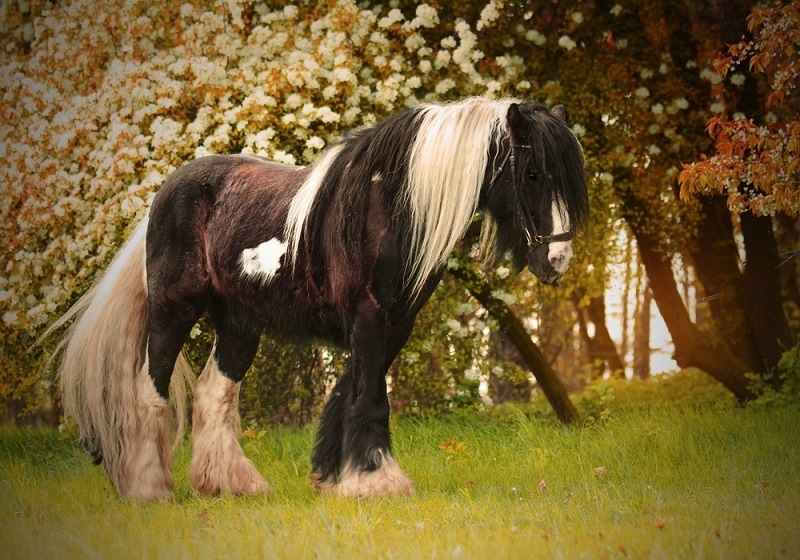
Where Did These Horses Originate From?
Irish Cobs, also known as Irish Tinkers or Gypsy Vanners, originate in Ireland. The breed is closely associated with the Romani or Gypsy people who traveled throughout Ireland, England, and Europe. The Irish Cobs were traditionally bred by the Gypsy community for their personal use as working horses, often serving as reliable and versatile family horses for various tasks such as pulling caravans, transportation, and agricultural work.
The specific origins of the Irish Cob breed are not well-documented, as they were primarily bred within the Gypsy community rather than through formal breeding programs. The breed’s ancestry is believed to include a combination of native Irish horses, such as the Irish Draught, and various imported draft horse breeds, including Clydesdales and Shires. Over time, the Gypsy people developed a distinct type of horse known for its strength, stamina, and gentle temperament, eventually becoming recognized as the Irish Cob or Irish Tinker.
Irish Cobs gained international recognition and popularity in the late 20th century due to their striking appearance and versatility. They are now bred and appreciated by horse enthusiasts worldwide, both within and outside the Gypsy community, for their beauty, gentle nature, and suitability for various equestrian activities.
Temperament & Intelligence of the Irish Cob Horse
The Irish Cob Horse is known for being gentle. They aren’t easily spooked or aggressive, which makes them good with children and other animals. They’re pretty easygoing, too. These horses aren’t usually high-strung or nervous. Instead, they’re perfectly content to just hang out.
They’re a pretty intelligent horse. They’re easier to train than many horses, making them a great choice for beginners. Plus, these horses tend to be very responsive. Irish Cobs are known for their problem-solving skills. They’re able to think for themselves and figure out how to solve problems, which makes them a great option for trail riding and other situations where they need to think quickly.
When raised properly, Irish Cobs are friendly and outgoing. They enjoy being around other people and horses.
Appearance & Varieties
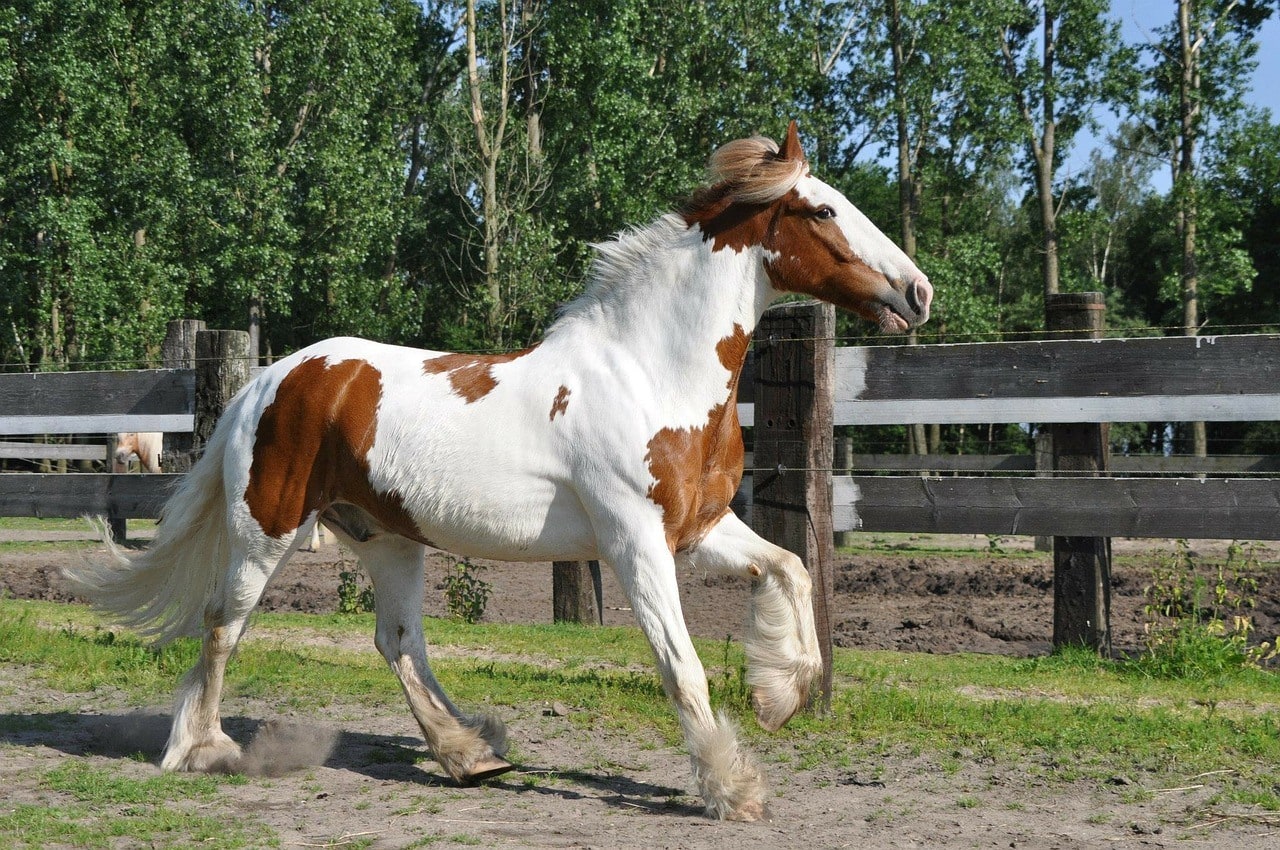
These horses are relatively large, with a solid build. They also come in many different colors. Usually, they are white with some other color. Some horses have large distributions of white, while others are primarily a different color.
One of the most notable characteristics of Irish Cobs is their abundant feathering on the lower legs. Feathering refers to the long, silky hair that grows from the knees and hocks down to the hooves. The feathering can be extensive and is often seen as one of the breed’s distinguishing features.
Along with this large amount of feathering, these horses have long, flowing manes and tails. Their hair is usually thicker than most, so be prepared for some extra grooming.
There aren’t any specific variations within the breed. However, Irish Cobs are bred for their type rather than strict adherence to specific conformation standards. This can lead to individual horses’ appearance variations, allowing for diverse characteristics and variations within the breed.
Things to Know When Owning an Irish Cob
Habitat & Stable Requirements 🌾
Irish Cob horses are extremely adaptable. They can live just about anywhere and are usually hardy. They don’t need any special care beyond the average horse. However, there are a few things you need to keep in mind.
They don’t need a particularly large stable, but they do need a secure place to sleep. The stable should be well-ventilated and have a dry floor. Like all horses, they’ll need bedding to keep them warm and comfortable.
Irish Cobs are social horses and do best when they have a stablemate. If you can’t keep your Irish Cob with another horse, you’ll need to spend plenty of time with them to make up for it. They have a very full mane and tails, and these should be braided when they aren’t being ridden to prevent tangling.
Food & Diet Requirements 🥕
Irish Cobs are heavy horses, which means that they need a diet high in fiber and low in starch. Hay is the most important part of their diet, as it is very high in fiber. It should help keep their digestive system healthy. You can use a variety of hays, including alfalfa, timothy, and oat hay.
When possible, you should also allow your Irish Cob to graze in a pasture. Grass will help them get some nutrients they need and provide even more fiber.
Avoid feeding too much grain. It’s heavy in sugars and starches, which is not what the average Irish Cob needs. You should feed your horse at regular intervals to help keep their blood sugar stable.
Exercise 🐎
Irish Cobs are a hardy breed that needs regular exercise to stay healthy and fit. They should be turned out in a paddock or pasture for at least several hours each day. They can also be ridden, driven, or worked in a variety of other ways.
As versatile horses, they can do almost any activity.

Training 🐴
Irish Cobs are a gentle and intelligent breed, making them relatively easy to train. However, it is important to be patient and consistent with your training, as they can be stubborn at times.
Start with basic obedience commands. This will help your horse to understand your expectations and to build trust with you. Remain patient and consistent with your training and plan to train daily. These horses occasionally have bouts of stubbornness, and it is important to continue training through these.
Make sure your horse is comfortable in the environment they’re training in, as this helps them focus on training. If your horse isn’t comfortable in their environment, training can be much harder. Irish Cobs can be sensitive horses, so be sure to only use positive reinforcement and a light touch. Look at their body language and stop training before they get frustrated.
Grooming 🧽
Irish Cobs do need some extra grooming to keep their coat healthy and free of mats. You’ll need to brush them daily, and their mane and tail should be combed regularly. Use a soft bristle brush for the majority of their body, and a comb for their mane and tail.
Keep an eye on your horse’s hooves for any cracks or chips. These need to be trimmed off if you notice any. Also keep an eye on their teeth, which can be a good indicator of their health.
The feathering on an Irish Cob’s legs is prone to matting, so be sure to pay extra attention to it.
Lifespan & Health Conditions 🏥
Irish Cobs have a pretty long lifespan of 20 to 25 years. They’re often considered healthy horses, but they can be prone to some health conditions.
For instance, gastric ulcers are a common problem among most horses and Irish Cobs are no exception. They can be caused by many things, including stress, poor diet, and overeating. Navicular disease is a painful condition that can also affect Irish Cobs. It affects a bone on the horse’s foot and can be challenging to treat.
PSSM is a genetic condition that affects the way the horse’s body metabolizes carbohydrates. It can cause a variety of symptoms, including muscle stiffness, weakness, and difficulty breathing. It can also affect Irish Cobs with some regularity.
By taking your Irish Cob to the veterinarian for regular checkups, you can help to identify any potential health problems early on and get them treated. You can also help to prevent health problems by feeding your horse a healthy diet, providing them with plenty of exercise, and keeping them free of stress.
Feeding these horses a healthy diet can go a long way to keeping them healthy.
Male vs. Female
Male Irish Cobs are often larger than females, with an average height of 15 hands. Females are typically about a hand shorter and around 200 pounds lighter.
Males are typically more muscular than females, with a broader chest and wider shoulders. Females are typically more slender and have a more feminine build. Males are also more dominant and may be harder to train. However, females are more docile and gentle.
3 Little-Known Facts About the Irish Cob
1. They were originally bred for pulley carriages.
The Irish Cob was originally bred to pull carriages and carts, and they were known for their strength and stamina. They were also used for farm work, and they were known for their gentle nature.
2. They have tons of feathering.
These horses are known for the thick feathering on their legs. While the amount can vary from horse to horse, it’s often pretty dramatic. Originally, it is thought that this feathering protected their legs from the cold and mud.
3. They’re the national horse of Ireland.
The Irish Cob was designated as the national horse of Ireland in 2010. This was a way to recognize the breed’s history and importance to Irish culture.

Final Thoughts
The Irish Cob is a heavy horse breed that originated in Ireland. They’re very gentle and versatile, allowing them to be used for almost everything. They’re also very healthy and have a long lifespan of up to 25 years.
These horses are thick and muscular. They have a long, flowing tail and mane and lots of feathering, which is one thing they are known for. They can weigh up to 1,200 pounds, with males often being larger than females.
If you’re looking for a gentle, intelligent, versatile horse, the Irish Cob may be a good option. While they aren’t one of the most popular horse breeds around, they do make great family horses.
Featured Image Credit: www.MartinaBurianova.cz, Shutterstock



